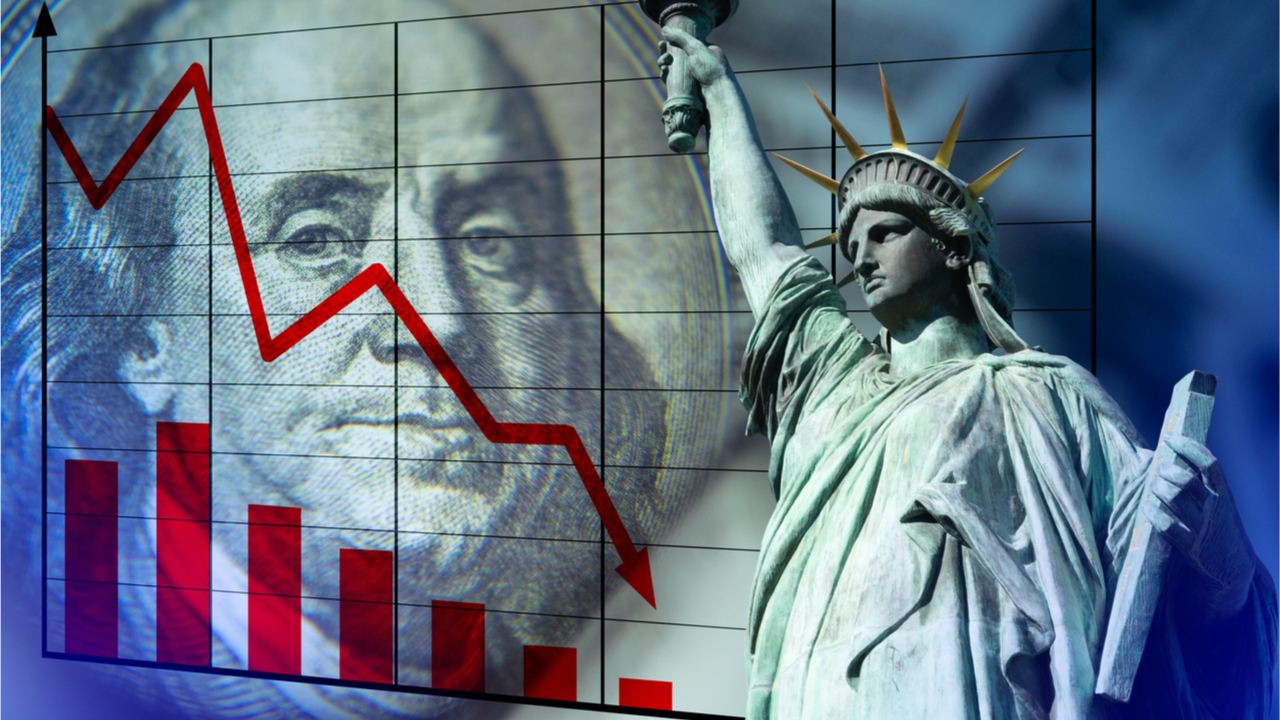Goldman Predicts US Recession Odds at 35% in 2 Years, John Mauldin Wouldn’t Be Surprised if Stocks Fell 40%

The American economy continues to look gloomy and signals pointing toward a looming recession continue to appear. In a note sent to clients this week, Goldman Sachs’ chief economist said the bank envisions the “odds of a recession as roughly 15% in the next 12 months and 35% within the next 24 months.” Furthermore, the renowned financial expert John Mauldin details that he would not be surprised if the stock market crashed by 40%, as he believes a recession is likely due this year.
Goldman Prediction: ‘Odds of a Recession Roughly 15% in the Next Year, 35% Within the Next 24 Months’
The U.S. economy is dealing with significant pressures as supply chains are restricted and consumer prices are soaring amid war taking place overseas in Europe. Just recently, Bitcoin.com News reported on last month’s consumer price index data that had shown America’s inflation rate increased sharply to 8.5% in March.
A couple days later, our newsdesk explained how the hedge fund manager Michael Burry believes the U.S. Federal Reserve has no intentions of fighting inflation. Moreover, the famed author, Robert Kiyosaki, thinks hyperinflation and depression are already here.
In a note sent to investors this week, Goldman Sachs’ chief economist Jan Hatzius detailed Goldman’s forecast and the probability of the U.S. falling into a recession. Hatzius said the Federal Reserve faces a “hard path to a soft landing” and Goldman expects the chances of a U.S. recession to be 35% over the next two years.
“Our analysis of historical G10 episodes suggests that although strong economic momentum limits the risk in the near-term, the policy tightening we expect raises the odds of recession. As a result, we now see the odds of a recession as roughly 15% in the next 12 months and 35% within the next 24 months,” Hatzius explained.
Hatzius further detailed that historical patterns are showing the economy could get rocky. He noted that 11 out of 14 economic cycles since World War II have led to a recession within a 24-month period. “Taken at face value, these historical patterns suggest the Fed faces a narrow path to a soft landing as it aims to close the jobs-workers gap and bring inflation back towards its 2% target,” Hatzius added.
Bridgewater Associates Founder Ray Dalio Expects a ‘Period of Stagflation’
Goldman’s chief economist is one of many predicting a downturn in the U.S. economy in the coming months. Over the last few months, a great number of financial analysts and economists have been attempting to predict the U.S. economy’s future.
During an interview with Yahoo Finance published on April 4, Ray Dalio, Bridgewater Associates founder, and co-chief investment executive, said he envisions a stagflation environment. Dalio remarked:
So what you have is enough tightening by the Federal Reserve to deal with inflation adequately, and that is too much tightening for the markets and the economy. So the Fed is going to be in a very difficult place a year from now as inflation still remains high and it starts to pinch on both the markets and the economy. I think that most likely what we’re going to have is a period of stagflation. And then you have to understand how to build a portfolio that’s balanced for that kind of environment.
Best-Selling Author and Financial Expert John Mauldin: ‘My Instinct Tells Me This Will Not Be a 12-Month Wait’
The well known financial expert John Mauldin is predicting an economic downturn as well, as he recently explained that he would not be surprised if the stock market crashed by 40%. “[Fed chair Jerome] Powell and his crew hope to engineer the fabled ‘soft landing,'” Mauldin opined. “I really doubt they can do it,” he added.
Mauldin remarked on how the 2-year Treasury yield recently surpassed the 10-year Treasury yield, which recorded an inverted yield curve. “That’s the opposite of normal. Then again, a bunch of things have been the opposite of normal lately,” Mauldin said. The financial analyst is known for predicting the U.S. recessions that occurred in 2000 and 2008, and he believes the tell-tale signs are no different. “We have many indications recession is near,” the blog post written by Mauldin notes. The financial analyst’s blog post concludes by stating:
There is absolutely no way to precisely predict when a recession begins. My instinct tells me this will not be a 12-month wait. I think things just continue to slow down and one day we’ll look up and see a recession. And then a little bit later we’ll be growing again. That’s how these things work.
What do you think about the predictions concerning a possible recession in the United States? Do you expect an economic downturn to take place in the near future? Let us know what you think about this subject in the comments section below.
from Bitcoin News https://ift.tt/9iryEdg
Comments
Post a Comment